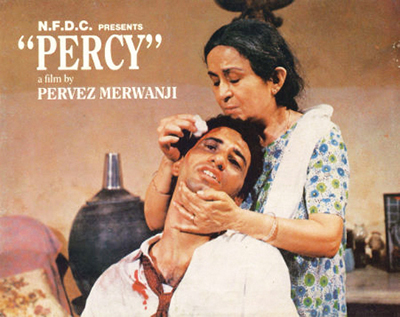Worshipping mummy
Berjis Desai
They come in all shapes and sizes. Mamma’s boys. Effeminate or macho, heterosexual or gay, married or bachelor, youthful or grey haired, wealthy or poor, orthodox or liberal, learned or lumpen. The number of Parsi men who are excessively attached to their mothers is startlingly large. According to Sigmund Freud, the Oedipus complex denotes a son’s latent desire to have sexual relations with the maternal parent. However, a child who subsequently identifies with the same sex parent successfully resolves this complex. If this identification fails, the boy remains a lifelong mamma’s boy. Unlike the BBC teleserial, "Some Mothers Do ’Ave ’Em,” most Parsi mothers seem to have them.
Here is a do-it-yourself test for determining if you are one. You are 60 but still call your mother ‘Mummy’ (with an unusual emphasis on the double ‘m’s). Your mother decides when you should have a haircut. You have rejected an extremely attractive matrimonial proposal because your mother will not approve of your wife-to-be. Though you reside in California, you connect with your mother on FaceTime twice every day (and your mother wears a wrist watch in India showing West Coast time). If it was not for Dr Rusi Soonawalla’s professional fees, your mother would have readily believed that your birth was a case of immaculate conception. You sheepishly smile when your mother criticizes the excessively long length of your sudreh and the excessively short length of your lengha, although only the two of you reside in the house. Even though you are an agnostic, you visit the agiary every month on your mother’s roz, 10 years after her passing into the Great Beyond. If you are terribly affronted by this quiz. Two or more affirmative answers make you a mamma’s boy.

Poster from the movie Percy that sensitively dealt with the relationship between a mother and a son
We must, of course, confess to our own idiosyncrasies. A few years ago, we had this morbid fear as to who would cut fruits (particularly, mangoes), at breakfast, as neatly and daintily as our mother, then approaching 90. Our fears were dissipated due to the skills in fruit cutting fortunately imbibed by our little maid, functioning under the old lady’s eagle eye. Again, we gladly sacrifice a crucial board meeting in order to have lunch with mummy on our roz birthday.
Then there is this bachelor friend of ours who celebrated his 40th birthday in an exotic location abroad with a select band of friends, and his beloved Mumma. One evening, the merry group amused themselves by blindfolding and one had to guess the identity of the individual touching you. Mumma touched our blindfolded friend lightly on his lips. He instantly said, "Of course, this has to be you, Mumma!”
We must exclude from the list of mamma’s boys those Parsis who are deferential to their mothers only in order to grab some property or inheritance. Every time mamma visits the family solicitor to discuss her fifth codicil to her ninth will, these Parsis have sleepless nights. They are imposters. A true mamma’s boy is one who worships his mother with unadulterated love and devotion. We have seen the most dispassionate and calm Parsi gentlemen go ballistic if anyone even slightly berates their mother’s record in public or social life. Machiavelli, a 16th century political pragmatist, had observed that men are more willing to forgive the murder of their father than the confiscation of their patrimony (inherited property from father). If Machiavelli had been a Parsi, he would have perhaps said that Parsi men are more willing to forgive any insult or injury, however severe but will not tolerate the slightest slur on the Mummy Goddess.
Decades ago, there was a Parsi conman who was called PM, who, apart from carrying out minor capers like credit card frauds, was a serial fantasizer. He amused his circle of friends which included many Parsi senior judges and senior lawyers of today. He published a compendium of articles titled "Zoroaster was the first cosmonaut in space”; "Pipe smoking cures lung cancer” etc, and claimed to have received honorary doctorates from Harvard, Oxford and Yale. Despite the many troubles he got into, his mother thought he was god and a wasted genius. He, of course, worshipped mummy. He would narrate his fantasy tales (including some unprintable ones about his alleged encounters with Marilyn Monroe and Donna Summers) to his fan club and, upon seeing disbelief on their faces, would call out to his mother and shout, "Isn’t this true, mumma? Mè tamuné kaheloon né?’ (Hadn’t I told you)?” His mother, with a deadpan expression, would regally sail past and say, "Of course, mara jaan, tè mané kaheloon!” Post that maternal validation, PM cared a damn if the world disbelieved him.
Such devotion can reach great heights. We know of a busy counsel of the Bombay High Court who, after a hectic day in Court, slept every night in The B. D. Petit Parsee General Hospital for two and a half years, despite his ailing mother having a private nurse.
Mercifully, Parsi girls (who, according to Freud, have the Electra complex) do not display any such obsessive devotion towards their fathers. The women of our tribe are obviously more formidable than men.
One of the primary reasons for the horrific demographic decline of our community is this mummy worship. This can best be illustrated in the words of Rusi, a handsome Cambridge postgraduate who, when repeatedly asked as to why he would not marry, simply stated: "Why on earth do I need to marry, when my mumma is there?”
Berjis M. Desai, senior partner of J. Sagar Associates, advocates and solicitors, is a writer and community activist.
